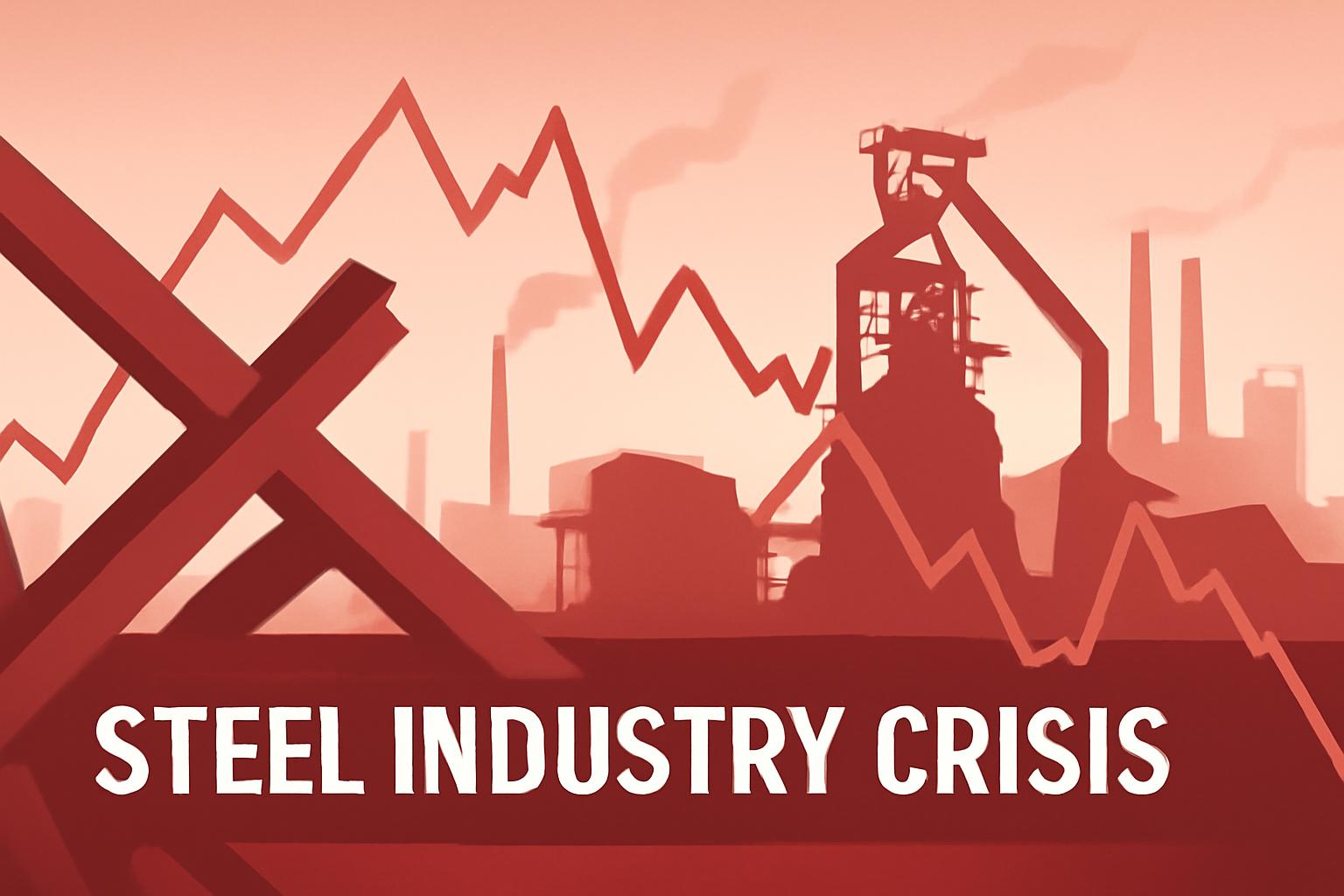The EU’s decision to tighten steel import quotas and double tariffs on excess imports poses a significant challenge to the UK steel industry and European manufacturing sectors. While designed to protect domestic steel production and jobs, the measures risk disrupting trade flows, inflating costs for steel-dependent industries, and potentially triggering retaliatory trade actions. !-- wp:paragraph -->
Contents
FinOracleAI — Market ViewEuropean Auto Industry Voices Concerns Over TariffsFinOracleAI — Market ViewTrade Relations: UK Seeks Exemptions Amid Uncertain FutureEuropean Auto Industry Voices Concerns Over TariffsFinOracleAI — Market ViewTrade Relations: UK Seeks Exemptions Amid Uncertain FutureEuropean Auto Industry Voices Concerns Over TariffsFinOracleAI — Market ViewGlobal Context: Following US and Canadian Tariff TrendsTrade Relations: UK Seeks Exemptions Amid Uncertain FutureEuropean Auto Industry Voices Concerns Over TariffsFinOracleAI — Market ViewGlobal Context: Following US and Canadian Tariff TrendsTrade Relations: UK Seeks Exemptions Amid Uncertain FutureEuropean Auto Industry Voices Concerns Over TariffsFinOracleAI — Market ViewUK Steel Industry Warns of Unprecedented CrisisGlobal Context: Following US and Canadian Tariff TrendsTrade Relations: UK Seeks Exemptions Amid Uncertain FutureEuropean Auto Industry Voices Concerns Over TariffsFinOracleAI — Market ViewUK Steel Industry Warns of Unprecedented CrisisGlobal Context: Following US and Canadian Tariff TrendsTrade Relations: UK Seeks Exemptions Amid Uncertain FutureEuropean Auto Industry Voices Concerns Over TariffsFinOracleAI — Market ViewEU Steel Tariff Hike Sparks Crisis Warning in UK Steel SectorUK Steel Industry Warns of Unprecedented CrisisGlobal Context: Following US and Canadian Tariff TrendsTrade Relations: UK Seeks Exemptions Amid Uncertain FutureEuropean Auto Industry Voices Concerns Over TariffsFinOracleAI — Market View
- Opportunities: Increased protection may stabilize EU steel producers and accelerate decarbonisation initiatives.
- Risks: UK steel exporters face market access loss; potential retaliatory tariffs could escalate trade tensions.
- European automakers may experience higher input costs and supply chain complexities due to restrictive quotas and new rules of origin.
- UK-EU trade relations may be strained, with negotiations critical to securing exemptions or quotas.
- Global steel market dynamics remain volatile amid ongoing accusations of dumping and protectionist responses.
ACEA Director General Sigrid de Vries remarked, “We recognize the need for protection but feel the Commission’s parameters go too far in isolating the European market. A better balance is needed between steel producers and users.”FinOracleAI — Market View
The EU’s decision to tighten steel import quotas and double tariffs on excess imports poses a significant challenge to the UK steel industry and European manufacturing sectors. While designed to protect domestic steel production and jobs, the measures risk disrupting trade flows, inflating costs for steel-dependent industries, and potentially triggering retaliatory trade actions. !-- wp:paragraph -->- Opportunities: Increased protection may stabilize EU steel producers and accelerate decarbonisation initiatives.
- Risks: UK steel exporters face market access loss; potential retaliatory tariffs could escalate trade tensions.
- European automakers may experience higher input costs and supply chain complexities due to restrictive quotas and new rules of origin.
- UK-EU trade relations may be strained, with negotiations critical to securing exemptions or quotas.
- Global steel market dynamics remain volatile amid ongoing accusations of dumping and protectionist responses.
British Industry Minister Chris McDonald stated, “We continue to explore stronger trade measures to protect U.K. steel producers from unfair behaviors,” while emphasizing the importance of maintaining trade flows with the EU.European Auto Industry Voices Concerns Over Tariffs
The European Automobile Manufacturers’ Association (ACEA) criticized the EU’s tariff changes, warning that the restrictions could inflate steel prices and burden European carmakers. With approximately 90% of their steel sourced within the EU, automakers fear the lowered quotas and doubled tariffs will limit their ability to manage supply and costs effectively. !-- wp:paragraph -->ACEA Director General Sigrid de Vries remarked, “We recognize the need for protection but feel the Commission’s parameters go too far in isolating the European market. A better balance is needed between steel producers and users.”FinOracleAI — Market View
The EU’s decision to tighten steel import quotas and double tariffs on excess imports poses a significant challenge to the UK steel industry and European manufacturing sectors. While designed to protect domestic steel production and jobs, the measures risk disrupting trade flows, inflating costs for steel-dependent industries, and potentially triggering retaliatory trade actions. !-- wp:paragraph -->- Opportunities: Increased protection may stabilize EU steel producers and accelerate decarbonisation initiatives.
- Risks: UK steel exporters face market access loss; potential retaliatory tariffs could escalate trade tensions.
- European automakers may experience higher input costs and supply chain complexities due to restrictive quotas and new rules of origin.
- UK-EU trade relations may be strained, with negotiations critical to securing exemptions or quotas.
- Global steel market dynamics remain volatile amid ongoing accusations of dumping and protectionist responses.
Trade Relations: UK Seeks Exemptions Amid Uncertain Future
The UK government is actively engaged in discussions with the EU and US to mitigate the impact of these tariffs. Unlike Norway, Iceland, and Liechtenstein—members of the European Economic Area exempt from the EU’s steel tariffs—the UK is outside the EEA but remains a close trading partner. !-- wp:paragraph -->British Industry Minister Chris McDonald stated, “We continue to explore stronger trade measures to protect U.K. steel producers from unfair behaviors,” while emphasizing the importance of maintaining trade flows with the EU.European Auto Industry Voices Concerns Over Tariffs
The European Automobile Manufacturers’ Association (ACEA) criticized the EU’s tariff changes, warning that the restrictions could inflate steel prices and burden European carmakers. With approximately 90% of their steel sourced within the EU, automakers fear the lowered quotas and doubled tariffs will limit their ability to manage supply and costs effectively. !-- wp:paragraph -->ACEA Director General Sigrid de Vries remarked, “We recognize the need for protection but feel the Commission’s parameters go too far in isolating the European market. A better balance is needed between steel producers and users.”FinOracleAI — Market View
The EU’s decision to tighten steel import quotas and double tariffs on excess imports poses a significant challenge to the UK steel industry and European manufacturing sectors. While designed to protect domestic steel production and jobs, the measures risk disrupting trade flows, inflating costs for steel-dependent industries, and potentially triggering retaliatory trade actions. !-- wp:paragraph -->- Opportunities: Increased protection may stabilize EU steel producers and accelerate decarbonisation initiatives.
- Risks: UK steel exporters face market access loss; potential retaliatory tariffs could escalate trade tensions.
- European automakers may experience higher input costs and supply chain complexities due to restrictive quotas and new rules of origin.
- UK-EU trade relations may be strained, with negotiations critical to securing exemptions or quotas.
- Global steel market dynamics remain volatile amid ongoing accusations of dumping and protectionist responses.
Trade Relations: UK Seeks Exemptions Amid Uncertain Future
The UK government is actively engaged in discussions with the EU and US to mitigate the impact of these tariffs. Unlike Norway, Iceland, and Liechtenstein—members of the European Economic Area exempt from the EU’s steel tariffs—the UK is outside the EEA but remains a close trading partner. !-- wp:paragraph -->British Industry Minister Chris McDonald stated, “We continue to explore stronger trade measures to protect U.K. steel producers from unfair behaviors,” while emphasizing the importance of maintaining trade flows with the EU.European Auto Industry Voices Concerns Over Tariffs
The European Automobile Manufacturers’ Association (ACEA) criticized the EU’s tariff changes, warning that the restrictions could inflate steel prices and burden European carmakers. With approximately 90% of their steel sourced within the EU, automakers fear the lowered quotas and doubled tariffs will limit their ability to manage supply and costs effectively. !-- wp:paragraph -->ACEA Director General Sigrid de Vries remarked, “We recognize the need for protection but feel the Commission’s parameters go too far in isolating the European market. A better balance is needed between steel producers and users.”FinOracleAI — Market View
The EU’s decision to tighten steel import quotas and double tariffs on excess imports poses a significant challenge to the UK steel industry and European manufacturing sectors. While designed to protect domestic steel production and jobs, the measures risk disrupting trade flows, inflating costs for steel-dependent industries, and potentially triggering retaliatory trade actions. !-- wp:paragraph -->- Opportunities: Increased protection may stabilize EU steel producers and accelerate decarbonisation initiatives.
- Risks: UK steel exporters face market access loss; potential retaliatory tariffs could escalate trade tensions.
- European automakers may experience higher input costs and supply chain complexities due to restrictive quotas and new rules of origin.
- UK-EU trade relations may be strained, with negotiations critical to securing exemptions or quotas.
- Global steel market dynamics remain volatile amid ongoing accusations of dumping and protectionist responses.
Global Context: Following US and Canadian Tariff Trends
The EU’s tariff hike follows similar protectionist measures by the US and Canada aiming to curb cheap steel imports, particularly from China. In 2025, the US increased tariffs on steel and aluminum imports to 50%, while Canada imposed import limits and a 25% surtax on steel originally melted and poured in China. !-- wp:paragraph --> China continues to reject allegations of dumping excess steel on the global market. The EU acknowledged that steel overcapacity is a global issue requiring coordinated action. !-- wp:paragraph -->Trade Relations: UK Seeks Exemptions Amid Uncertain Future
The UK government is actively engaged in discussions with the EU and US to mitigate the impact of these tariffs. Unlike Norway, Iceland, and Liechtenstein—members of the European Economic Area exempt from the EU’s steel tariffs—the UK is outside the EEA but remains a close trading partner. !-- wp:paragraph -->British Industry Minister Chris McDonald stated, “We continue to explore stronger trade measures to protect U.K. steel producers from unfair behaviors,” while emphasizing the importance of maintaining trade flows with the EU.European Auto Industry Voices Concerns Over Tariffs
The European Automobile Manufacturers’ Association (ACEA) criticized the EU’s tariff changes, warning that the restrictions could inflate steel prices and burden European carmakers. With approximately 90% of their steel sourced within the EU, automakers fear the lowered quotas and doubled tariffs will limit their ability to manage supply and costs effectively. !-- wp:paragraph -->ACEA Director General Sigrid de Vries remarked, “We recognize the need for protection but feel the Commission’s parameters go too far in isolating the European market. A better balance is needed between steel producers and users.”FinOracleAI — Market View
The EU’s decision to tighten steel import quotas and double tariffs on excess imports poses a significant challenge to the UK steel industry and European manufacturing sectors. While designed to protect domestic steel production and jobs, the measures risk disrupting trade flows, inflating costs for steel-dependent industries, and potentially triggering retaliatory trade actions. !-- wp:paragraph -->- Opportunities: Increased protection may stabilize EU steel producers and accelerate decarbonisation initiatives.
- Risks: UK steel exporters face market access loss; potential retaliatory tariffs could escalate trade tensions.
- European automakers may experience higher input costs and supply chain complexities due to restrictive quotas and new rules of origin.
- UK-EU trade relations may be strained, with negotiations critical to securing exemptions or quotas.
- Global steel market dynamics remain volatile amid ongoing accusations of dumping and protectionist responses.
“Government must go all out to leverage our trading relationship with the European Union to secure U.K. country quotas or potentially face disaster,” said Stace. Emily Sawicz, Industrials Senior Analyst at RSM UK, highlighted the threat posed by the EU’s move, noting that approximately 80% of UK steel exports go to the EU. She emphasized the risk of losing access to the UK’s largest and most strategic export market amid rising global competition and energy costs.
!-- wp:paragraph -->Global Context: Following US and Canadian Tariff Trends
The EU’s tariff hike follows similar protectionist measures by the US and Canada aiming to curb cheap steel imports, particularly from China. In 2025, the US increased tariffs on steel and aluminum imports to 50%, while Canada imposed import limits and a 25% surtax on steel originally melted and poured in China. !-- wp:paragraph --> China continues to reject allegations of dumping excess steel on the global market. The EU acknowledged that steel overcapacity is a global issue requiring coordinated action. !-- wp:paragraph -->Trade Relations: UK Seeks Exemptions Amid Uncertain Future
The UK government is actively engaged in discussions with the EU and US to mitigate the impact of these tariffs. Unlike Norway, Iceland, and Liechtenstein—members of the European Economic Area exempt from the EU’s steel tariffs—the UK is outside the EEA but remains a close trading partner. !-- wp:paragraph -->British Industry Minister Chris McDonald stated, “We continue to explore stronger trade measures to protect U.K. steel producers from unfair behaviors,” while emphasizing the importance of maintaining trade flows with the EU.European Auto Industry Voices Concerns Over Tariffs
The European Automobile Manufacturers’ Association (ACEA) criticized the EU’s tariff changes, warning that the restrictions could inflate steel prices and burden European carmakers. With approximately 90% of their steel sourced within the EU, automakers fear the lowered quotas and doubled tariffs will limit their ability to manage supply and costs effectively. !-- wp:paragraph -->ACEA Director General Sigrid de Vries remarked, “We recognize the need for protection but feel the Commission’s parameters go too far in isolating the European market. A better balance is needed between steel producers and users.”FinOracleAI — Market View
The EU’s decision to tighten steel import quotas and double tariffs on excess imports poses a significant challenge to the UK steel industry and European manufacturing sectors. While designed to protect domestic steel production and jobs, the measures risk disrupting trade flows, inflating costs for steel-dependent industries, and potentially triggering retaliatory trade actions. !-- wp:paragraph -->- Opportunities: Increased protection may stabilize EU steel producers and accelerate decarbonisation initiatives.
- Risks: UK steel exporters face market access loss; potential retaliatory tariffs could escalate trade tensions.
- European automakers may experience higher input costs and supply chain complexities due to restrictive quotas and new rules of origin.
- UK-EU trade relations may be strained, with negotiations critical to securing exemptions or quotas.
- Global steel market dynamics remain volatile amid ongoing accusations of dumping and protectionist responses.
UK Steel Industry Warns of Unprecedented Crisis
Gareth Stace, Director General of UK Steel, described the tariff hike as potentially “the biggest crisis the U.K. steel industry has ever faced.” The sector is already grappling with steelworks closures, thousands of job losses, and existing 25% US tariffs on steel exports. !-- wp:paragraph -->“Government must go all out to leverage our trading relationship with the European Union to secure U.K. country quotas or potentially face disaster,” said Stace. Emily Sawicz, Industrials Senior Analyst at RSM UK, highlighted the threat posed by the EU’s move, noting that approximately 80% of UK steel exports go to the EU. She emphasized the risk of losing access to the UK’s largest and most strategic export market amid rising global competition and energy costs.
!-- wp:paragraph -->Global Context: Following US and Canadian Tariff Trends
The EU’s tariff hike follows similar protectionist measures by the US and Canada aiming to curb cheap steel imports, particularly from China. In 2025, the US increased tariffs on steel and aluminum imports to 50%, while Canada imposed import limits and a 25% surtax on steel originally melted and poured in China. !-- wp:paragraph --> China continues to reject allegations of dumping excess steel on the global market. The EU acknowledged that steel overcapacity is a global issue requiring coordinated action. !-- wp:paragraph -->Trade Relations: UK Seeks Exemptions Amid Uncertain Future
The UK government is actively engaged in discussions with the EU and US to mitigate the impact of these tariffs. Unlike Norway, Iceland, and Liechtenstein—members of the European Economic Area exempt from the EU’s steel tariffs—the UK is outside the EEA but remains a close trading partner. !-- wp:paragraph -->British Industry Minister Chris McDonald stated, “We continue to explore stronger trade measures to protect U.K. steel producers from unfair behaviors,” while emphasizing the importance of maintaining trade flows with the EU.European Auto Industry Voices Concerns Over Tariffs
The European Automobile Manufacturers’ Association (ACEA) criticized the EU’s tariff changes, warning that the restrictions could inflate steel prices and burden European carmakers. With approximately 90% of their steel sourced within the EU, automakers fear the lowered quotas and doubled tariffs will limit their ability to manage supply and costs effectively. !-- wp:paragraph -->ACEA Director General Sigrid de Vries remarked, “We recognize the need for protection but feel the Commission’s parameters go too far in isolating the European market. A better balance is needed between steel producers and users.”FinOracleAI — Market View
The EU’s decision to tighten steel import quotas and double tariffs on excess imports poses a significant challenge to the UK steel industry and European manufacturing sectors. While designed to protect domestic steel production and jobs, the measures risk disrupting trade flows, inflating costs for steel-dependent industries, and potentially triggering retaliatory trade actions. !-- wp:paragraph -->- Opportunities: Increased protection may stabilize EU steel producers and accelerate decarbonisation initiatives.
- Risks: UK steel exporters face market access loss; potential retaliatory tariffs could escalate trade tensions.
- European automakers may experience higher input costs and supply chain complexities due to restrictive quotas and new rules of origin.
- UK-EU trade relations may be strained, with negotiations critical to securing exemptions or quotas.
- Global steel market dynamics remain volatile amid ongoing accusations of dumping and protectionist responses.
UK Steel Industry Warns of Unprecedented Crisis
Gareth Stace, Director General of UK Steel, described the tariff hike as potentially “the biggest crisis the U.K. steel industry has ever faced.” The sector is already grappling with steelworks closures, thousands of job losses, and existing 25% US tariffs on steel exports. !-- wp:paragraph -->“Government must go all out to leverage our trading relationship with the European Union to secure U.K. country quotas or potentially face disaster,” said Stace. Emily Sawicz, Industrials Senior Analyst at RSM UK, highlighted the threat posed by the EU’s move, noting that approximately 80% of UK steel exports go to the EU. She emphasized the risk of losing access to the UK’s largest and most strategic export market amid rising global competition and energy costs.
!-- wp:paragraph -->Global Context: Following US and Canadian Tariff Trends
The EU’s tariff hike follows similar protectionist measures by the US and Canada aiming to curb cheap steel imports, particularly from China. In 2025, the US increased tariffs on steel and aluminum imports to 50%, while Canada imposed import limits and a 25% surtax on steel originally melted and poured in China. !-- wp:paragraph --> China continues to reject allegations of dumping excess steel on the global market. The EU acknowledged that steel overcapacity is a global issue requiring coordinated action. !-- wp:paragraph -->Trade Relations: UK Seeks Exemptions Amid Uncertain Future
The UK government is actively engaged in discussions with the EU and US to mitigate the impact of these tariffs. Unlike Norway, Iceland, and Liechtenstein—members of the European Economic Area exempt from the EU’s steel tariffs—the UK is outside the EEA but remains a close trading partner. !-- wp:paragraph -->British Industry Minister Chris McDonald stated, “We continue to explore stronger trade measures to protect U.K. steel producers from unfair behaviors,” while emphasizing the importance of maintaining trade flows with the EU.European Auto Industry Voices Concerns Over Tariffs
The European Automobile Manufacturers’ Association (ACEA) criticized the EU’s tariff changes, warning that the restrictions could inflate steel prices and burden European carmakers. With approximately 90% of their steel sourced within the EU, automakers fear the lowered quotas and doubled tariffs will limit their ability to manage supply and costs effectively. !-- wp:paragraph -->ACEA Director General Sigrid de Vries remarked, “We recognize the need for protection but feel the Commission’s parameters go too far in isolating the European market. A better balance is needed between steel producers and users.”FinOracleAI — Market View
The EU’s decision to tighten steel import quotas and double tariffs on excess imports poses a significant challenge to the UK steel industry and European manufacturing sectors. While designed to protect domestic steel production and jobs, the measures risk disrupting trade flows, inflating costs for steel-dependent industries, and potentially triggering retaliatory trade actions. !-- wp:paragraph -->- Opportunities: Increased protection may stabilize EU steel producers and accelerate decarbonisation initiatives.
- Risks: UK steel exporters face market access loss; potential retaliatory tariffs could escalate trade tensions.
- European automakers may experience higher input costs and supply chain complexities due to restrictive quotas and new rules of origin.
- UK-EU trade relations may be strained, with negotiations critical to securing exemptions or quotas.
- Global steel market dynamics remain volatile amid ongoing accusations of dumping and protectionist responses.
EU Steel Tariff Hike Sparks Crisis Warning in UK Steel Sector
The European Union’s recent announcement to drastically reduce tariff-free steel import quotas and increase tariffs on excess imports has sent shockwaves through the UK steel industry. The proposed measures include a 47% cut in quotas compared to 2024 levels and a tariff hike from 25% to 50% on steel imports exceeding these quotas. !-- wp:paragraph --> The European Commission justified the move as necessary to protect EU steel jobs and support decarbonisation efforts, replacing the existing steel safeguard that expires in June 2026. However, the decision has provoked strong opposition from UK industry leaders and European car manufacturers alike. !-- wp:paragraph -->UK Steel Industry Warns of Unprecedented Crisis
Gareth Stace, Director General of UK Steel, described the tariff hike as potentially “the biggest crisis the U.K. steel industry has ever faced.” The sector is already grappling with steelworks closures, thousands of job losses, and existing 25% US tariffs on steel exports. !-- wp:paragraph -->“Government must go all out to leverage our trading relationship with the European Union to secure U.K. country quotas or potentially face disaster,” said Stace. Emily Sawicz, Industrials Senior Analyst at RSM UK, highlighted the threat posed by the EU’s move, noting that approximately 80% of UK steel exports go to the EU. She emphasized the risk of losing access to the UK’s largest and most strategic export market amid rising global competition and energy costs.
!-- wp:paragraph -->Global Context: Following US and Canadian Tariff Trends
The EU’s tariff hike follows similar protectionist measures by the US and Canada aiming to curb cheap steel imports, particularly from China. In 2025, the US increased tariffs on steel and aluminum imports to 50%, while Canada imposed import limits and a 25% surtax on steel originally melted and poured in China. !-- wp:paragraph --> China continues to reject allegations of dumping excess steel on the global market. The EU acknowledged that steel overcapacity is a global issue requiring coordinated action. !-- wp:paragraph -->Trade Relations: UK Seeks Exemptions Amid Uncertain Future
The UK government is actively engaged in discussions with the EU and US to mitigate the impact of these tariffs. Unlike Norway, Iceland, and Liechtenstein—members of the European Economic Area exempt from the EU’s steel tariffs—the UK is outside the EEA but remains a close trading partner. !-- wp:paragraph -->British Industry Minister Chris McDonald stated, “We continue to explore stronger trade measures to protect U.K. steel producers from unfair behaviors,” while emphasizing the importance of maintaining trade flows with the EU.European Auto Industry Voices Concerns Over Tariffs
The European Automobile Manufacturers’ Association (ACEA) criticized the EU’s tariff changes, warning that the restrictions could inflate steel prices and burden European carmakers. With approximately 90% of their steel sourced within the EU, automakers fear the lowered quotas and doubled tariffs will limit their ability to manage supply and costs effectively. !-- wp:paragraph -->ACEA Director General Sigrid de Vries remarked, “We recognize the need for protection but feel the Commission’s parameters go too far in isolating the European market. A better balance is needed between steel producers and users.”FinOracleAI — Market View
The EU’s decision to tighten steel import quotas and double tariffs on excess imports poses a significant challenge to the UK steel industry and European manufacturing sectors. While designed to protect domestic steel production and jobs, the measures risk disrupting trade flows, inflating costs for steel-dependent industries, and potentially triggering retaliatory trade actions. !-- wp:paragraph -->- Opportunities: Increased protection may stabilize EU steel producers and accelerate decarbonisation initiatives.
- Risks: UK steel exporters face market access loss; potential retaliatory tariffs could escalate trade tensions.
- European automakers may experience higher input costs and supply chain complexities due to restrictive quotas and new rules of origin.
- UK-EU trade relations may be strained, with negotiations critical to securing exemptions or quotas.
- Global steel market dynamics remain volatile amid ongoing accusations of dumping and protectionist responses.













